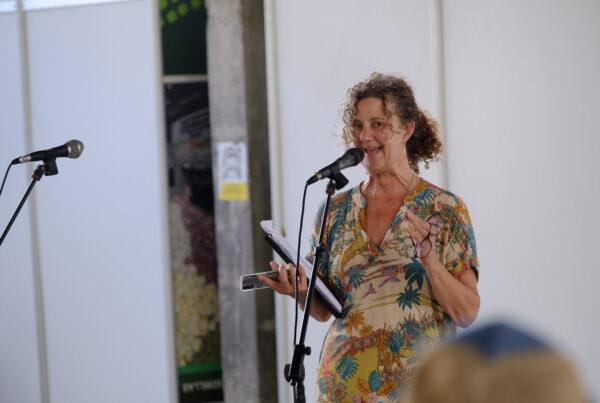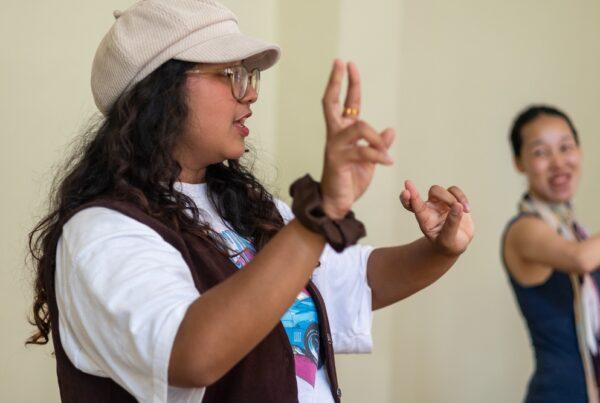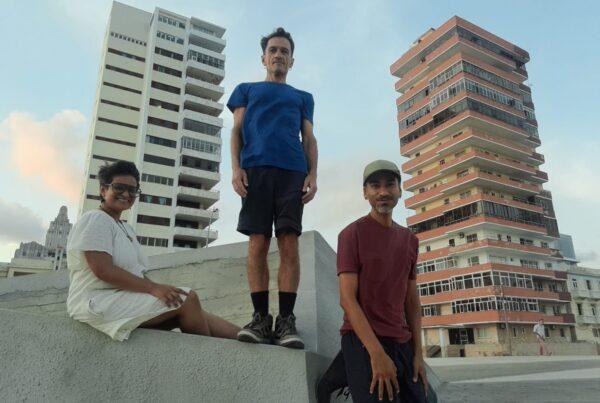Within the premisses of the Little Theatre ‘Duško Radović’ in downtown Belgrade, the formal ceremony of the ASSITEJ Artistic Gathering 2023 saw a full house who anticipated the to watch Bambi, a play directed by Bojana Lazić and dramatised by Uglješa ŠAJTINAC and Bojana Lazić.
Prior to raising the curtain, President of ASSITEJ International, Sue Giles took to the stage, welcoming the opening of the festival and bringing to light the essence of the festival’s title: Turning Point.
“In the midst of the pandemic, after the World Congress, the new executive committee chose re-generation as a dramaturgical focus for the next 3 years,” reveals Giles. “As one of the executive members recently put it, it’s ASSITEJ’s super power, how can it not be, when we’re making work for, with and about children and young people. Re-generation is about recognising and welcoming the changes that are inevitable in new growth; we cannot return to the past however much we long for it, and new growth is surprising, it has different shapes, a new direction, a turning point,” she adds.

President of ASSITEJ International, Sue Giles
To this end, Giles put forward that ‘Turning Point’ reflects what we are seeing in our own lives and in the individual sectors we work in. “We’re feeling the changes, the shifts in the very air we breath and in the way we create… the paste of change has accelerated, we’re all running hard to keep up, trying to stay in one position, let alone trying to keep ahead of the game. We can all see the shifts that are creating uncertainty, we’re aware of the world in ways that are often alarming, the ground can feel shaky sometimes, our purpose and association can feel flimsy compared to the events that are unfolding around us,” adds Giles.
Yet Giles turns to Diana Kržanić Tepavac’s (President of ASSITEJ Serbia) words. “As Diana says, these events can be turning points for our community, these moments are the ones that make the most sense, that create meaning despite of and perhaps because of the massive swirl of information given to us everyday, we know that humans are feeling increasingly isolated and alone, and so here we are, with our purpose in mind, as a community of workers in the realms of imagination, knowing that we can make a difference, not alone, but together and this in itself is an act of hope. We can create our own Turning points and an ASSITEJ gathering can be one for all of us,” says Giles.

Audiences at the official opening ceremony attend welcome speeches and watch Bambi
“One of my favourite responses from an audience member, a child of 3 years, was: ‘it made my bones stronger’; we’re fuelling our audiences bones and hearts and minds by the work we do, we are providing scaffolding and foundations, we are inviting them to be part of creating the world and connecting voices here and around the world…The voices of young people are imbedded in this festival to bring forward the contribution young people have and must have on their world and the decisions that shape it. It’s precious that we can have this time together to share what we know and do and to learn from the great minds, the experience, the artistry and the new thoughts are all part of this association,” concludes Giles.
Following welcoming speeches, and as the organisers invited the audience to recall their own childhoods in anticipation of watching Bambi, a play that had a specific connotation for most, if not all of us in the audience, the curtains raised.
BAMBI – maternal love lasts forever
For director Bojana Lazić, playwright Uglješa Šajtinac, and the ensemble of the Little Theater Duško Radović, the focus of the story about ‘Bambi’, a little fawn created by the writer Felix Salten, was on the love between mother and child. Although the story of losing a significant person is poignant and devastatingly sad, the authors provided comfort. People, parents, and friends may die, but their love remains. That immense, and omnipresent love was embodied on stage by a large source of warm light. Before Bambi’s mother’s death, the audience was emotionally and rationally prepared for death through the comedic scene of the ‘last conversation of two leaves’. A comic relief about leaves occurs as autumn approaches, and the two leaves discuss the falling that awaits them. Essentially, they talk about death, and the afterlife, and how new leaves will take their place. The play destigmatizes death, portraying it as traumatic, but an integral part of life.

Another important message of the play is that people can simultaneously do both good and evil. The hunter, for example, shot Bambi’s mother, but he helped Bambi’s injured and sick friend recover. In terms of directing and acting, the stage movement is particularly interesting. Animals don’t use hands, so their movement resembles a contemporary dance. Hands are reserved only for humans who are alienated from nature, who believe that nature belongs to them, and who, with those hands, more often destroy than heal.
In the context of regional children’s theater, plays that carefully and nurturingly address taboos are rare, and that’s why ‘Bambi’ is a precious example of how, in children’s theater, there are no forbidden topics; one just needs to find appropriate approaches.

Melissa Hekkers is a freelance journalist and author.
Her most recent book, Amir’s Blue Elephant, a creative non-fiction based on her experiences working in the Moria refugee camp in Lesvos, Greece and Cyprus. In 2018, she launched the My Cyprus Mandala Series, colouring books inspired by the natural and cultural heritage of Cyprus. In 2007, she published her first children’s book in both English and Greek entitled Crocodile, which won the Cyprus State Illustration Award. In 2012, she launched her second children’s book Flying across Red Skies (in English and Greek), using an experimental approach to literature, for which she was nominated for the Cyprus State Literary award. Her third, similarly well-received children’s book was Pupa (Greek and English), published in 2014 and was adapted as a theatre play in 2019. In between her last two books, she published her first free-verse poetry book entitled Come-forth. In 2019 she was contributing author to the anthology Nicosia Beyond Barriers: Voices from a Divided City, published by Saqi Books, London.
Divna Stojanov is a dramaturg and playwright. She also writes theatre reviews.






